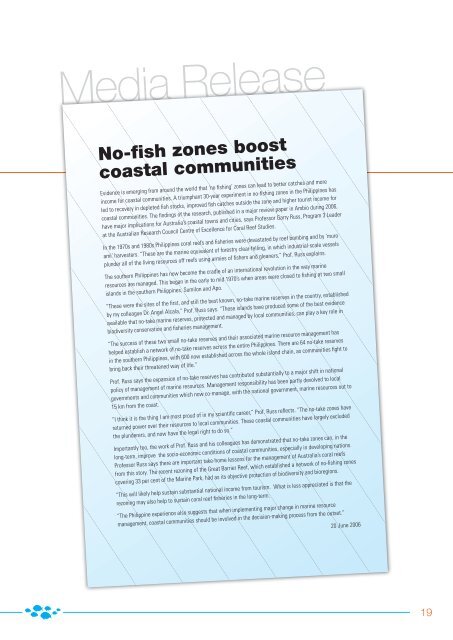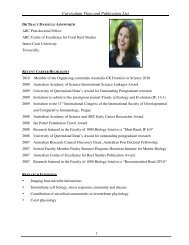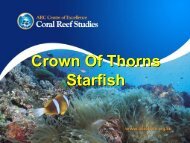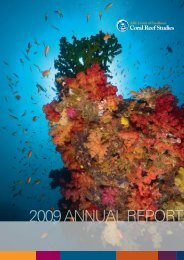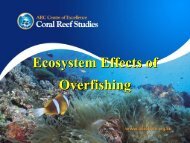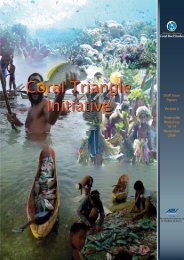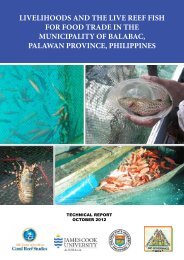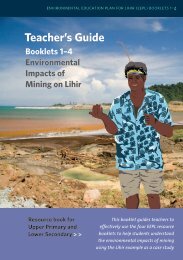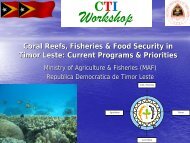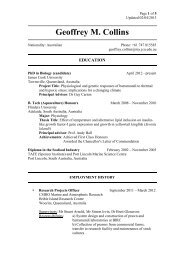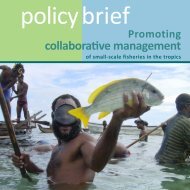Media ReleaseNo-fish zones boostcoastal communitiesEvidence is emerging from around the world that ‘no fi shing’ zones can lead to better catches and moreincome <strong>for</strong> coastal communities. A triumphant 30-year experiment in no-fishing zones in the Philippines hasled to recovery in depleted fi sh stocks, improved fi sh catches outside the zone and higher tourist income <strong>for</strong>coastal communities. The findings <strong>of</strong> the research, published in a major review paper in Ambio during 2006,have major implications <strong>for</strong> Australia’s coastal towns and cities, says Pr<strong>of</strong>essor Garry Russ, Program 3 Leaderat the Australian Research Council <strong>Centre</strong> <strong>of</strong> <strong>Excellence</strong> <strong>for</strong> <strong>Coral</strong> <strong>Reef</strong> <strong>Studies</strong>.In the 1970s and 1980s Philippines coral reefs and fisheries were devastated by reef bombing and by ‘muroami’ harvesters. “These are the marine equivalent <strong>of</strong> <strong>for</strong>estry clear-felling, in which industrial-scale vesselsplunder all <strong>of</strong> the living resources <strong>of</strong>f reefs using armies <strong>of</strong> fishers and gleaners,” Pr<strong>of</strong>. Russ explains.The southern Philippines has now become the cradle <strong>of</strong> an international revolution in the way marineresources are managed. This began in the early to mid 1970’s when areas were closed to fishing at two smallislands in the southern Philippines, Sumilon and Apo.“These were the sites <strong>of</strong> the fi rst, and still the best known, no-take marine reserves in the country, establishedby my colleague Dr. Angel Alcala,” Pr<strong>of</strong>. Russ says. “These islands have produced some <strong>of</strong> the best evidenceavailable that no-take marine reserves, protected and managed by local communities, can play a key role inbiodiversity conservation and fi sheries management.“The success <strong>of</strong> these two small no-take reserves and their associated marine resource management hashelped establish a network <strong>of</strong> no-take reserves across the entire Philippines. There are 64 no-take reservesin the southern Philippines, with 600 now established across the whole island chain, as communities fight tobring back their threatened way <strong>of</strong> life.”Pr<strong>of</strong>. Russ says the expansion <strong>of</strong> no-take reserves has contributed substantially to a major shift in nationalpolicy <strong>of</strong> management <strong>of</strong> marine resources. Management responsibility has been partly devolved to localgovernments and communities which now co-manage, with the national government, marine resources out to15 km from the coast.“I think it is the thing I am most proud <strong>of</strong> in my scientific career,” Pr<strong>of</strong>. Russ refl ects. “The no-take zones havereturned power over their resources to local communities. These coastal communities have largely excludedthe plunderers, and now have the legal right to do so.”Importantly too, the work <strong>of</strong> Pr<strong>of</strong>. Russ and his colleagues has demonstrated that no-take zones can, in thelong-term, improve the socio-economic conditions <strong>of</strong> coastal communities, especially in developing nations.Pr<strong>of</strong>essor Russ says there are important take-home lessons <strong>for</strong> the management <strong>of</strong> Australia’s coral reefsfrom this story. The recent rezoning <strong>of</strong> the Great Barrier <strong>Reef</strong>, which established a network <strong>of</strong> no-fi shing zonescovering 33 per cent <strong>of</strong> the Marine Park, had as its objective protection <strong>of</strong> biodiversity and bioregions.“This will likely help sustain substantial national income from tourism. What is less appreciated is that therezoning may also help to sustain coral reef fi sheries in the long-term.“The Philippine experience also suggests that when implementing major change in marine resourcemanagement, coastal communities should be involved in the decision-making process from the outset.“20 June 200619
Program 4:Genetic, molecular andphysiological processesResearchersOve Hoegh-Guldberg (Program Leader)Ken AnthonyLine Bay (Research Fellow)Sophie DoveBill Leggatt (Research Fellow)David MillerMadeleine van OppenMauricio Rodriguez-Lanetty (ResearchFellow)Bette WillisDavid YellowleesThis diverse program seeks tounderstand coral reef processes ata molecular and physiological levelto examine potential mechanisms<strong>for</strong> adaptation and acclimatization toenvironmental change. Specifi c areas<strong>of</strong> study include biochemical analysis <strong>of</strong>coral-zooxanthellae interactions, coralbleaching, physiology, sub-lethal stressindicators, energetic modeling, coraldiseases and genomics.<strong>Centre</strong> fellow Bill Leggat moved fromthe UQ node <strong>of</strong> the <strong>Centre</strong> to take up apermanent lectureship position at JCU,while Chief Investigator Ken Anthonymoved from JCU to UQ. Two newfellows were also appointed, Line Bayin Townsville, and Mauricio Rodriguez-Lanetty in Brisbane. Program Leader, OveHoegh-Guldberg, chairs the World BankGlobal Environmental Fund (GEF) WorkingGroup on <strong>Coral</strong> Bleaching. In 2006, the<strong>ARC</strong> <strong>Centre</strong> initiated joint workshops,co-funded postdoctoral positions, anddeveloped several new research projectsinvolving GEF researchers.Bette Willis led a major expansion in2006 <strong>of</strong> the <strong>Centre</strong>’s research focus oncoral disease. Bette is Co-Chair (withher colleague, Drew Harvell from CornellUniversity) <strong>of</strong> the World Bank GlobalEnvironmental Fund (GEF) WorkingGroup on <strong>Coral</strong> Disease. In January,she and Program 4 Leader Ove Hoegh-Guldberg organized a joint <strong>ARC</strong> <strong>Centre</strong> <strong>of</strong><strong>Excellence</strong>-GEF international workshopon “Integrating the GBR into a GlobalResearch Plan <strong>for</strong> the Study <strong>of</strong> <strong>Coral</strong>Disease” In April, Bette led a capacitybuildingworkshop <strong>for</strong> East African coralreef managers sponsored by the WorldBank GEF Program, the <strong>ARC</strong> <strong>Centre</strong>, anda consortium <strong>of</strong> government agenciesand NGOs. In June, she presented anoverview <strong>of</strong> coral disease on the GBRand Indo-Pacifi c to NOAA’s (NationalOceanic and Atmospheric Administration)<strong>Coral</strong> Disease and Health ConsortiumWorkshop, in Honolulu. Willis is alsocoordinating an international committeeto develop standard nomenclature andsurvey methods <strong>for</strong> Indo-Pacific coralsdiseases, <strong>for</strong> publication as a NOAATechnical Report. In July, she provideda background briefi ng paper on coraldisease on the Great Barrier <strong>Reef</strong>at the request <strong>of</strong> the EnvironmentalProtection Agency Brisbane <strong>for</strong> theQueensland State Minister <strong>for</strong> theEnvironment. Fieldwork this yearfocussed on identifying links betweenthermal anomalies and coral disease, topredict the impact <strong>of</strong> global warming onemergent disease dynamics.<strong>Centre</strong> fellow Line Bay, PartnerInvestigator Madeleine Van Oppenand Bette Willis launched a new set<strong>of</strong> collaborative projects that willinvestigate the potential <strong>for</strong> adaptationby corals and their symbionts. Initialwork is focussing on estimating thelevel <strong>of</strong> genetic connectivity amongGBR populations <strong>of</strong> corals and theiralgal endosymbionts, and on identifyingmechanisms <strong>of</strong> adaptation by coralpopulations to climate change. This workincludes a common-garden experiment,designed to determine whether geneexpression differences are maintainedbetween populations from differentthermal environments.A series <strong>of</strong> papers by Ken Anthony,Ove Hoegh-Guldberg and others, onphysiological responses to environmentalstressors were completed this year. Theyall address key environmental issueson coral reefs (thermal and light stress,water quality and sedimentation). SophieDove demonstrated the role <strong>of</strong> coralpigments in facilitating photosynthesis.A series <strong>of</strong> experiments were undertakento successfully infect juvenile corals withspecifi c strains <strong>of</strong> symbionts under arange <strong>of</strong> temperature and light regimes.A large team <strong>of</strong> researchers in Program 4,led by Bill Leggat and Dave Miller, havealso developed expanded microarrays<strong>for</strong> Acropora and Symbiodinium in 2006,setting the scene <strong>for</strong> activities nextyear that will contribute significantly tounderstand the molecular and geneticresponse <strong>of</strong> the coral-din<strong>of</strong>lagellateholobiont to thermal stress.20


